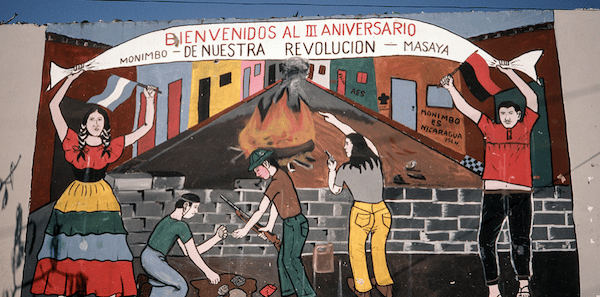Dan Kovalik first became aware of a place called Nicaragua in the autumn of 1979.
Two new students joined the school he attended as an 11-year-old at Milford, Ohio, in the United States. The students, Juan and Carlos, were both from Nicaragua and, it turns out, they were the sons of the former dictator of the country, Anastasio Somoza who had just been ousted by the popular Sandinista revolution.
Kovalik doesn’t pretend that this sparked any real awareness or sudden interest in revolutionary politics but it did ignite a curiosity about Nicaragua and the region as well as the role of the U.S.
But in his introduction to his excellent new book, Nicaragua: A History of U.S. Intervention and Resistance, Kovalik says how shocking he found the murder of Archbishop Oscar Romero in El Salvador in 1980 while he was saying Mass in a hospital chapel.
The killing of the archbishop by U.S.-backed paramilitaries forced Kovalik for the first time to really “question the nature of my country and government.”
He also tells of a very right-wing teacher who invited a leader of the terrorist group the Nicaraguan Contras to speak at his school.
Kovalik was told that the U.S.-backed Contras were fighting a battle for freedom against the Sandinistas. It wasn’t until he became more politically engaged at college that the truth of the situation began to be revealed and, over time, he became more involved in supporting the revolution.
Over 40 years later as a now renowned human rights lawyer who has written widely on Venezuela, Russia, the CIA, Iran, Bernie Sanders and lots more, why this book now about Nicaragua?
One of the sparks was the 2018 coup attempt in the country. It just drew me even closer to the revolution.
But I also realised that a lot of people had abandoned Nicaragua and had been taken in by the Western propaganda about the country being a dictatorship.
Kovalik calls out those activists on the left who felt able to support other left governments but not Nicaragua.
Nicaragua is somehow seen as different by people who support Cuba and Venezuela.
While some accuse the country of being a dictatorship the fact is “Nicaragua has a multiple party democracy and introduced the first democratic elections in 1984.
“That the Sandinistas were voted out of power in 1990–at virtual gunpoint by the U.S.–and were out of power for 17 years is basically ignored,” he adds.
I ask Kovalik why he chose to foreground resistance in the title of the book when most writers would be content to provide a historical narrative.
“Resistance is continual in Nicaragua,” he says.
The Sandinista revolution was a real David and Goliath story that really does go under the radar.
The country is very small and poor but when called on, time after time, the Nicaraguan people have risen to the challenge.
It really is a story of resistance which must be told and retold as often as possible.
Nicaragua, alongside Cuba, he says, are really the only remaining remnants of armed revolutionary defeats of U.S.-backed forces in Latin America.
Both countries have faced sanctions but have continued not just to accept solidarity but even with all the pressures they face to provide support to others in the face of U.S. hostility and economic sanctions and military threats.
The story of Nicaragua is not a tale of resistance without success. Kovalik points to the success of the country in promoting women’s equality.
“Nicaragua is something like seventh in the whole world for women’s equality, which is a major achievement when you consider the resources they have at their disposal.
“It’s an absolute cornerstone of the revolution that, again, goes largely unseen,” he says.
But, Kovalik says, this is no time for self-congratulation. The continuing efforts of the U.S. to overthrow governments in the region and their recent support for the coup in Peru must ring alarm bells for everyone.
He says:
There are still plenty of dangers out there which should tell everyone that we can’t take anything for granted. Nothing is permanent.
Progress can easily be thwarted so it’s really important that we do all that we can to help consolidate the revolution and not allow others–inside or outside the country–to undermine it.
Measures to defend and consolidate the Sandinista revolution will be portrayed as dictatorship so we have to vigorously refute this argument.
The first duty of any revolution is to defend the revolution from attacks.
Kovalik called on progressives in Britain to step up support for the right of the people of Nicaragua to determine their own future.
On the whole I’m hopeful for the future as long as we all come together to stop the interference of the U.S. in Latin America and pressure is applied to governments across the world to end sanctions.
Kovalik adds:
The people of Nicaragua really appreciate the solidarity that is given to them. They especially love visits to their country and the desire to help–so why not visit?
Material support is of course also really important if you can’t visit yourself.
“The world is better off with the revolution of the Sandinistas so we all have to do what we can to defend them,” he says.
Dan Kovalik is speaking at the Latin American Adelante! conference in London today, Saturday January 28.
His book, Nicaragua: A History of U.S. Intervention and Resistance, is published by Clarity Press in paperback and costs £24.15.

